|
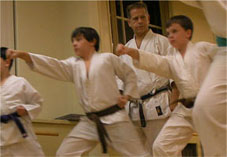
My philosophy and the philosophy of our
club is that the fundamental principles of karate that children
learn are no different than those that are taught to adults.
However, our method of instruction for children
is slightly different than how we teach adults, due to the
difference in maturity level and musculature development in young
children. However, as the children approach the teen years these
differences become less apparent. Our expectations are the same for
all children and adults.
In addition to personal attributes such as concentration, focus,
discipline and mutual and self-respect, we also stress certain
physical aspects of karate expected for all age levels, such as
synchronization of movement, ibuki (strong exhale), messen (eye
vector), fumikomi (pressure). We have no classes specifically
tailored to children with special needs. Although, we do take
into consideration learning difficulties with which some individuals
may be challenged, our expectation is that that all students must be
able to take instruction and not be disruptive to others in
class.
Attitude to teaching
If you expect to get a
Black Belt within a year this is NOT the place to be. Students are
not allowed to test for their first kyu rank (colored belt) until
after being in attendance for two sessions. Although children tend
to experience an adequate level of achievement through the first
years of study. Belt exams occur at a less frequent interval as the
child matures both age wise and in terms of karate experience. The
frequency of testing approaches that of the adult program
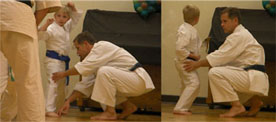 The reasoning
is that Traditional Karate is not about “getting a black belt”,
although this is a noble goal. My philosophy is that the study of
karate is learning about how to deal with the interaction of our ego
and the world around us. The dojo (an area where an
individual trains by themselves or with others) is the place
where we experience and become more aware of how and what we are
thinking, through our training and interaction with our instructors
and fellow students. Although we nurture the spirit of the
individual, we also challenge the spirit to express itself against
adversity when appropriate. The reasoning
is that Traditional Karate is not about “getting a black belt”,
although this is a noble goal. My philosophy is that the study of
karate is learning about how to deal with the interaction of our ego
and the world around us. The dojo (an area where an
individual trains by themselves or with others) is the place
where we experience and become more aware of how and what we are
thinking, through our training and interaction with our instructors
and fellow students. Although we nurture the spirit of the
individual, we also challenge the spirit to express itself against
adversity when appropriate.
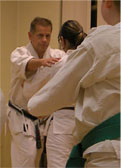 Consistent with our expectations of
a high level of maturity associated with increased study in the
martial arts, we do NOT develop 6-year-old black belts. In fact the
level of Sho-dan, or first-degree black belt is not conferred upon
any of our students until they have at least reached the age of 16.
We have excellent students who have studied diligently for over 6
years and have all of the physical capabilities to perform the
testing requirement to obtain a black belt in any “so-called” karate
school. We feel the responsibility is similar to the maturity level
expected for driving a Consistent with our expectations of
a high level of maturity associated with increased study in the
martial arts, we do NOT develop 6-year-old black belts. In fact the
level of Sho-dan, or first-degree black belt is not conferred upon
any of our students until they have at least reached the age of 16.
We have excellent students who have studied diligently for over 6
years and have all of the physical capabilities to perform the
testing requirement to obtain a black belt in any “so-called” karate
school. We feel the responsibility is similar to the maturity level
expected for driving a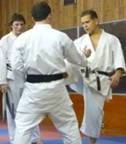 car. car.
Teaching experience
I have had the good
fortune to be able to teach karate to children and adults of all
ages from 5 to 55 and older. I started teaching children at Peterson
Park back in 1993. Prior to that I taught children in the Sugiyama
dojo as well as at Portage Park. I began teaching formal classes for
adults in the 1980’s in the Sugiyama dojo, where I continue to teach
as the Senior Instructor or Shusheki Shihan.
Karate history 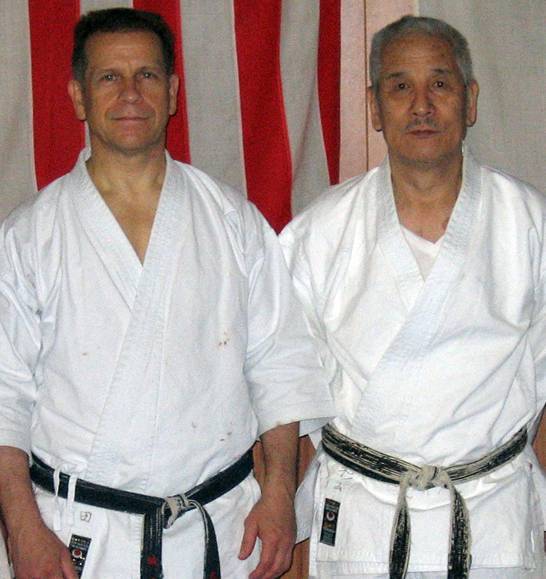
My relationship with Sensei
Sugiyama began when I first began studying karate while I was in
Graduate School at the University of Illinois, Chicago in the
1970’s. After a year or so of taking instructions in several styles
of karate at the University, I heard about Sensei Sugiyama’s Dojo. I
began studying with him in the late 70s and received my Sho-dan from
him and Sensei Nishiyama in 1982. After receiving my doctorate the
same year, I left for a post-doctoral fellowship at Mayo Clinic in
Rochester, MN. I returned to Chicago, where I took a job in a major
Health Care Company. Although I had job offers in other areas of the
country, one of the contributing factors in taking a job in the
Chicago area was to continue my training with Sensei Sugiyama.
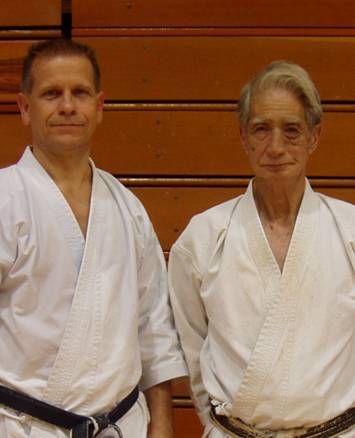 Over the last 3 decades I have continued to study under Sensei
Sugiyama being the most senior student who regularly studies under
Sensei Sugiyama. Over these years, I could not have helped but to
assimilate many aspects of his innovative teaching style. As an
instructor at his dojo as well as in my own, I utilize all of his
innovative principles in the development of my teaching style.
Over the last 3 decades I have continued to study under Sensei
Sugiyama being the most senior student who regularly studies under
Sensei Sugiyama. Over these years, I could not have helped but to
assimilate many aspects of his innovative teaching style. As an
instructor at his dojo as well as in my own, I utilize all of his
innovative principles in the development of my teaching style.
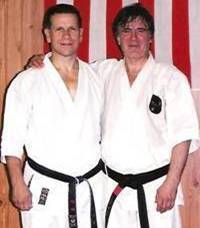 I have also had the opportunity to teach
students from many different countries that have visited the
Sugiyama dojo as well as through my travels as an International
Judge and giving clinics abroad. Through these experiences, I have
found that karate can be a commonality which can bridge many
cultural and chronological bridges. I have also had the opportunity to teach
students from many different countries that have visited the
Sugiyama dojo as well as through my travels as an International
Judge and giving clinics abroad. Through these experiences, I have
found that karate can be a commonality which can bridge many
cultural and chronological bridges.
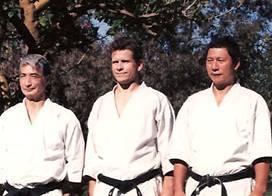
In addition to my training under the late Sensei Nishiyama,
over the years, I have had the opportunity to train with many of the
top instructors in karate and I continue this interaction
today. I believe this continued interaction and
discussion of the fundamental principles of karate and its
methods of instruction should occur across all organizational
entities. It is a fundamental responsibility of all
instructors to pursue these kind of interactions in order to truly
continue the tradition and advance the art. 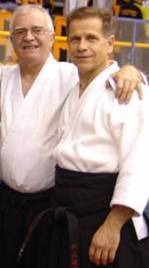
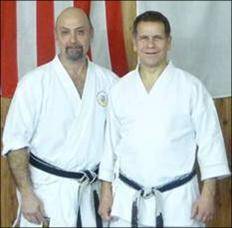
| 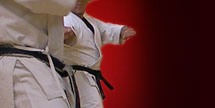
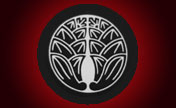
 ABOUT US
ABOUT US CLASSES
CLASSES SCHEDULE
SCHEDULE PHILOSOPHY
PHILOSOPHY INSTRUCTORS
INSTRUCTORS CONTACT
CONTACT
